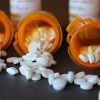Breath Test May Detect Colon Cancer
- Health & Healing
- December 10, 2012
In a new study from Italy, researchers were able to identify patients with colorectal cancer with an accuracy of over 75% by analyzing samples of their breath. So a breath test, similar to the one used to determine when a driver has had too much to drink, is now showing promise as a screening tool
READ MORESimple measures cut infections caught in hospitals
- Health & Healing
- December 3, 2012
A project at seven big hospitals reduced infections after colorectal surgeries by nearly one-third. It prevented an estimated 135 infections, saving almost $4 million, the Joint Commission hospital regulating group and the American College of Surgeons announced Wednesday. The two groups directed the 2 1/2-year project. Solutions such as germ-fighting soap and wound-protecting devices were
READ MOREProbiotics’ Benefits May Be More Than a Gut Feeling
- Health & Healing
- November 30, 2012
Probiotics are widely used to aid digestion and help restore gut bacterial balance after antibiotics. But some researchers are investigating the beneficial bugs for conditions that have nothing to do with the digestive tract. The Wall Street Journal, 11/27/2012
READ MOREGupta: Let’s End the Prescription Drug Death Epidemic
- Health & Healing
- November 21, 2012
It's the biggest man-made epidemic in the United States: accidental death from prescription drug overdoses. A person dies every 19 minutes, on average, from an accidental prescription drug overdose. This is a problem that affects celebrities, returning veterans, and everyday people who get caught up in taking pain pills and other prescription drugs and eventually become
READ MORE10 shocking medical mistakes
- Health & Healing
- November 13, 2012
Medical errors kill over 250,000 people in the United States yearly. Fortunately, though, there are strategies you can use to help doctors and nurses avoid mistakes. CNN, 11/5/2012
READ MOREDealing with Emotional, Physical Toll of Sandy
- Health & Healing
- November 12, 2012
Millions face post-storm anxiety and fear as they struggle to rebuild their lives. NBC’s chief medical editor Dr. Nancy Synderman shares tips on how to cope with the emotional stress. Today, 11/4/2012
READ MORETop medical innovations treat headaches, diabetes
- Health & Healing
- November 5, 2012
The best medical innovations for next year include an almond-size device that's implanted in the mouth to relieve severe headaches and a hand-held scanner resembling a blow dryer that detects skin cancer, the Cleveland Clinic said on Wednesday. Doctors and researchers at the Clinic voted for what they thought were the biggest, most significant innovations from
READ MOREHurricane Sandy food safety resources
- Health & Healing
- October 30, 2012
Safety and sufficient rations should take top priority in a hurricane or any kind of natural disaster. This article compiles helpful information and links to important resources on food storage and preparedness. CNN Eatocracy, 10/29/2012
READ MORELike girls, U.S. boys may be hitting puberty earlier
- Health & Healing
- October 22, 2012
Boys in the United States may be entering puberty earlier than in generations past, a new study has found, suggesting it's not just girls who are developing at younger ages. Reuters, 10/21/2012
READ MORECan a few cherries a day keep gout away?
- Health & Healing
- October 22, 2012
A U.S. study of people with gout linked eating the fruit with a 35 percent to 75 percent lower risk of having an attack. Reuters, 10/14/2012
READ MOREA Spotlight on Compounded Medicines
- Health & Healing
- October 18, 2012
An outbreak of fungal meningitis has focused attention on the reformulation of drugs. The New York Times, 10/16/2012
READ MOREThe Good, the Bad and the Eww of Earwax Removal
- Health & Healing
- October 18, 2012
Doctors say that unless it's causing bothersome symptoms, earwax should be left alone… yet 12 million Americans visit medical professionals annually for earwax removal, and millions more are having it done at spas and ear-candling parlors. The Wall Street Journal, 10/16/2012
READ MOREWhat Your Breath Reveals
- Health & Healing
- October 16, 2012
Researchers have found that each person has a unique breath 'fingerprint' that physicians could use to diagnose a growing number of health problems. Using this knowledge, doctors have already started developing painless, inexpensive tests to diagnose lung cancer, diabetes, and more. The Wall Street Journal, 10/8/2012
READ MOREIs it possible to be too clean? Researchers say yes
- Health & Healing
- October 10, 2012
Scientists are discovering that the very tools we use to battle bacteria and viruses- things like antibacterial soap and hand sanitizers- may actually end up 'training' our immune systems to attack allergens, causing the recent rise in asthma and allergies in America. NBC News, 10/8/2012
READ MOREWhy patients don’t report medical errors
- Health & Healing
- September 28, 2012
Many of the people who suffer harm while undergoing medical care do not file formal complaints with regulators. The reasons are numerous: They’re often traumatized, disabled, unaware they’ve been a victim of a medical error or don’t understand the bureaucracy. NBC News, 9/26/2012
READ MOREFeatured Stories
-
The texting dead
- Lifestyle & Relationships
- April 8, 2013
-
The business of happy families: Family Inc.
- Home & Family
- February 12, 2013
-

-
It All Started With a 12-Year-Old Cousin
- Making a Positive Difference
- February 3, 2014
-
Brought back from the dead
- Health & Healing
- May 5, 2014












